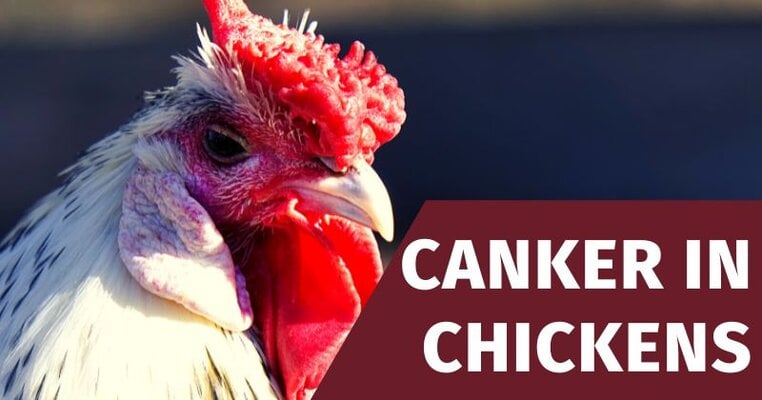Canker in chickens (Avian Trichomonosis), is a disease caused by one-celled protozoa, mostly infecting young birds. Lesions within the mouth and esophagus are caused by this illness, which principally affects chickens' upper gastrointestinal systems.
As the disease progresses, the lesions often become bigger, preventing the chicken from swallowing food and water. Occasionally, the lesions in the esophagus can grow so large as to completely block the opening, which results in suffocation. These lesions inside the oral cavity have also grown, in some severe cases, so large that the lesions have penetrated into the brain through the bases of their skulls.
Depending on a bird's vulnerability and the disease's virulence, it can range from mild to severe. When a bird recovers, although asymptomatic, it becomes a carrier and resistant to reinfection.

Physical examinations will enable your veterinarian to detect lesions (yellow-white and often with a cheese-like texture) that are characteristic of the disease in your bird's mouth, esophagus & crop. After your bird's lesions are identified, your veterinarian might test any discharge from your bird's beak or from the lesions (or cheesy material) in its mouth/throat. An examination of this material under a microscope will determine whether it contains this parasite.
It is likely that most birds will recover, but severely debilitated birds with serious respiratory and/or gastrointestinal damage can suffer fatal results from infection.
Have you ever come across canker in your chickens? If so, how did you deal with it?
As the disease progresses, the lesions often become bigger, preventing the chicken from swallowing food and water. Occasionally, the lesions in the esophagus can grow so large as to completely block the opening, which results in suffocation. These lesions inside the oral cavity have also grown, in some severe cases, so large that the lesions have penetrated into the brain through the bases of their skulls.
Depending on a bird's vulnerability and the disease's virulence, it can range from mild to severe. When a bird recovers, although asymptomatic, it becomes a carrier and resistant to reinfection.
How is Canker in Chickens Transmitted?
Canker is primarily transmitted through:- Infected poop and saliva spread the infection
- Through feed or drinking water that has been contaminated
- Wild birds can also spread the disease
Affected areas of the body include:
- Esophagus
- Oral Cavity
- Crop
- Proventriculus
Clinical Signs & Symptoms of Canker in Chickens
- A reduction in weight
- A decrease in appetite & water intake
- Swallowing difficulties
- Breathing through an open mouth
- Mouth odor
- Feathers that are ruffled and dull
- Balance problems, inability to stand
- Poop that is green and has diarrhea
- A greenish fluid in the mouth and crop, as well as yellow-white bumps
- Pendulous crop, delayed crop emptying
- Sudden death
Treatment of Canker in Chickens
Make sure the sick bird is isolated from the flock and placed in a warm, safe location with easy access to food and water. Stress must be limited. Get in touch with your veterinarian for a diagnosis as chickens may need debridement to remove diphtheritic plaque in their mouths.Drug Treatments:
- Metronidazole (Flagyl)
- Carnidazole (Spartrix)
- Toltrazuril
- Ronidazole
- Dimetridazole
Prevention of Canker in Chickens
- Feeders and waterers should not be accessible to doves or pigeons to prevent transmission.
- Make sure chickens don't drink from the same water sources as wild birds. You can add acidified copper sulfate solution (powdered bluestone) to drinking water once a month for three consecutive days if wild birds regularly access chicken waterers.
- Maintain a sanitary environment
- You can add apple cider vinegar to drinking water on a regular basis (once a month or so) at a rate of 1 tablespoon per gallon (15 ml per 4 liters).
- Ensure that feeders & waterers are regularly disinfected
- Maintain good biosecurity practices
Conclusion
Your veterinarian will be able to diagnose this disease. You should inform your veterinarian if your bird exhibits any of the symptoms listed above, as well as how long it has displayed them. Your veterinarian should also be informed how your bird may have become infected.Physical examinations will enable your veterinarian to detect lesions (yellow-white and often with a cheese-like texture) that are characteristic of the disease in your bird's mouth, esophagus & crop. After your bird's lesions are identified, your veterinarian might test any discharge from your bird's beak or from the lesions (or cheesy material) in its mouth/throat. An examination of this material under a microscope will determine whether it contains this parasite.
It is likely that most birds will recover, but severely debilitated birds with serious respiratory and/or gastrointestinal damage can suffer fatal results from infection.
Have you ever come across canker in your chickens? If so, how did you deal with it?


